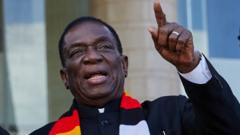Zimbabwean President Emmerson Mnangagwa has appointed a new army chief in a strategic move to consolidate power as protests loom.
Zimbabwe's President Appoints New Army Chief Amidst Growing Political Pressure

Zimbabwe's President Appoints New Army Chief Amidst Growing Political Pressure
As calls for resignation mount, President Mnangagwa names Emmanuel Matatu to bolster military loyalty.
---
Zimbabwe's President Emmerson Mnangagwa has made a significant military appointment by naming Emmanuel Matatu as the new chief of the army. This move arrives at a crucial time with anticipated protests planned for Monday, led by war veterans demanding the president's resignation. Matatu, a former major general and veteran from Zimbabwe's liberation war, takes charge immediately, succeeding Lt Gen Anselem Sanyatwe, who has been reassigned to a ministerial position in sports, arts, and culture.
The political landscape this week has been fraught, with mounting pressures from both the general public and former allies who criticize Mnangagwa for his leadership, citing mismanagement and corruption. As he faces increasing demands to step down, including calls for Vice-President Constantino Chiwenga to take over the presidency, the appointment of Matatu is seen as an effort to ensure loyalty within the military ranks.
Emmanuel Matatu, reportedly 72, has a significant history, having trained in Zambia as part of Zipra, one of the liberation factions that fought against the colonial regime in Rhodesia. His close ties to the current leader of the Zimbabwe Defence Forces (ZDF), Philip Valerio Sibanda, reinforce Mnangagwa's efforts to cement control within the military. Observers note that such consolidation could provide Mnangagwa with a sense of security amidst ongoing challenges to his authority.
Despite public assurances that he would not seek to extend his term which ends in 2028, the president’s past ambitions have kept suspicions alive. Following a series of contentious rallies wherein he was accused of trying to prolong his presidency, the situation remains tense, with security forces preemptively warning the public against participating in the upcoming protests. A four-day ban on carrying weapons has been enacted in the capital, highlighting the government's anticipation of civil unrest.
The political scene in Zimbabwe is precarious, and with Matatu at the helm of the army now, the dynamics of Mnangagwa's rule will be closely monitored as the country approaches potentially turbulent times.
Zimbabwe's President Emmerson Mnangagwa has made a significant military appointment by naming Emmanuel Matatu as the new chief of the army. This move arrives at a crucial time with anticipated protests planned for Monday, led by war veterans demanding the president's resignation. Matatu, a former major general and veteran from Zimbabwe's liberation war, takes charge immediately, succeeding Lt Gen Anselem Sanyatwe, who has been reassigned to a ministerial position in sports, arts, and culture.
The political landscape this week has been fraught, with mounting pressures from both the general public and former allies who criticize Mnangagwa for his leadership, citing mismanagement and corruption. As he faces increasing demands to step down, including calls for Vice-President Constantino Chiwenga to take over the presidency, the appointment of Matatu is seen as an effort to ensure loyalty within the military ranks.
Emmanuel Matatu, reportedly 72, has a significant history, having trained in Zambia as part of Zipra, one of the liberation factions that fought against the colonial regime in Rhodesia. His close ties to the current leader of the Zimbabwe Defence Forces (ZDF), Philip Valerio Sibanda, reinforce Mnangagwa's efforts to cement control within the military. Observers note that such consolidation could provide Mnangagwa with a sense of security amidst ongoing challenges to his authority.
Despite public assurances that he would not seek to extend his term which ends in 2028, the president’s past ambitions have kept suspicions alive. Following a series of contentious rallies wherein he was accused of trying to prolong his presidency, the situation remains tense, with security forces preemptively warning the public against participating in the upcoming protests. A four-day ban on carrying weapons has been enacted in the capital, highlighting the government's anticipation of civil unrest.
The political scene in Zimbabwe is precarious, and with Matatu at the helm of the army now, the dynamics of Mnangagwa's rule will be closely monitored as the country approaches potentially turbulent times.


















